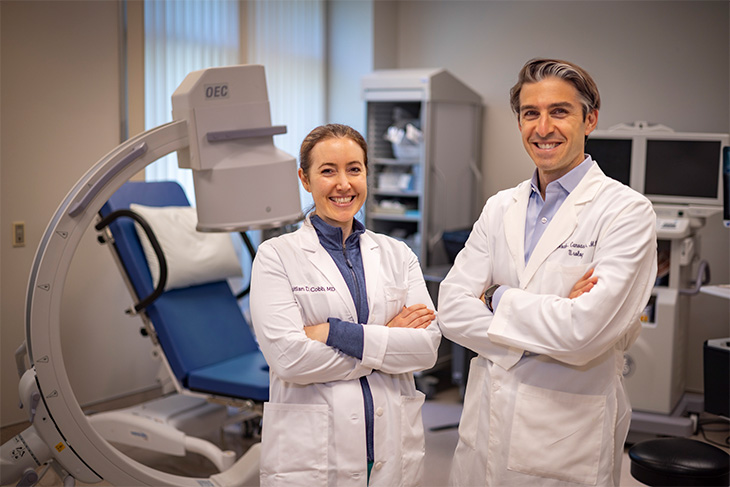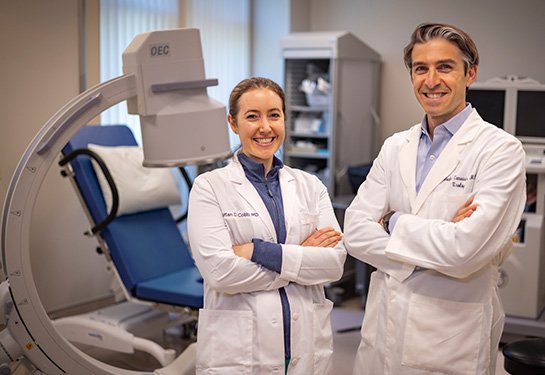More than 500,000 people visit emergency departments each year for painful kidney stones, which are hard crystals that form in the kidneys and urinary tract. An estimated 1 in 10 people will suffer from kidney stones at some point in their lifetime.

UC Davis Health is expanding its capabilities to treat complex kidney stone cases with the addition of Kaitlan Cobb, a skilled endoscopic urologist with advanced training in kidney stone disease using endoscopic techniques. Cobb joins Noah Canvas, an endoscopic urologist who has been with UC Davis Health since 2017. Canvas is an associate professor and Cobb is an assistant professor in the UC Davis Health Department of Urological Surgery.
Cobb joined the University of California, Davis Medical Center earlier this year, and in the Q&A below, Cobb shares an update on one of the most common, yet painful, illnesses facing Americans.
What is UC Davis Health’s approach to managing kidney stone cases?
Kidney stone disease is complex and many patients require multiple approaches to treatment. We offer a quarterly kidney stone clinic where patients can see a urologist, nephrologist and nutritionist in one appointment. This saves patients time and allows us to coordinate care to get the best possible care for them. Adult patients are seen in the morning and pediatric patients in the afternoon.
In the adult clinic, patients are first examined by a urologist and a dietician who specializes in kidney stones, who then refer them to a nephrologist if necessary, mainly for patients with multiple kidney diseases.
How does pediatric kidney stone treatment differ from adult kidney stone treatment?
Thankfully, many pediatric patients do well with our least invasive treatment, shock wave lithotripsy, which breaks up stones into small pieces. In younger patients, kidney stones are closer to the skin, making them more susceptible to being broken up by externally applied shock waves. When this method doesn’t work or isn’t possible, we use many of the same tools as adult kidney stone surgery; however, we take great care and focus on the least invasive approach possible.
What makes UC Davis Health unique in treating kidney stones?
There are few multidisciplinary kidney stone centers in the country. In fact, UC Davis Health is the only one in the Sacramento area. We offer more comprehensive care with physicians from various specialties. We also have two full-time urologists and are well-equipped to serve the large number of kidney stone patients we see from all over Northern California. This allows us to provide more timely care.
Are kidney stones becoming more common?
The number of kidney stone sufferers is on the rise, and there are many reasons for this. Indeed, diet plays a major role in the growing number of cases. Chronic dehydration, excessive salt intake, and increased intake of animal proteins such as beef, chicken, and fish all increase the risk of developing kidney stones. Additionally, health conditions such as metabolic syndrome, diabetes, and gout are also on the rise, which are also contributing to the rise in kidney stones. Genetic disorders may also play a role.
What is the latest in kidney stone treatments?
For prevention, we prescribe medications for the most severe cases to help prevent stones. Several advances have been made in surgery, including the use of suction devices, to help remove kidney stones more efficiently. This reduces surgery time and improves success rates.
What are the symptoms to watch out for?
Kidney stones usually start to hurt when they block the urinary tract and prevent urine from being excreted from the kidneys. You may feel a sharp pain on either side of your lower back. Other symptoms include:
- Blood in the urine
- Nausea or vomiting
- Frequent urination, especially if infection has already been ruled out
- If you have an infection, you may have chills or a fever (in this case it is important to seek emergency medical care)
What is the best way to prevent kidney stones?
- Drink plenty of water, at least 80 ounces (10 cups) each day.
- Reduce salt intake, especially from processed foods
- Limit your intake of animal protein sources (such as beef, chicken, or fish) to less than 8 ounces per day.
For more information about kidney stone care, call the UC Davis Urological Surgery Clinic at 916-734-2222 or 800-770-6930.


